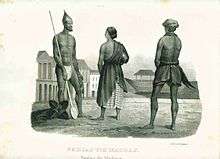Outcast (person)
An outcast is someone who is rejected or 'cast out', as from home or society,[1] or in some way excluded, looked down upon, or ignored. In common English speech an outcast may be anyone who does not fit in with normal society, which can contribute to a sense of isolation.
History

In Ancient Greece the Athenians had a procedure known as "ostracism" in which all citizens could write a person's name on a shard of broken pottery (called ostraka) and place it in a large container in a public place. If an individual's name was written a sufficient number of times, they were "ostracized"—banished from the city for ten years. This was normally practiced against individuals who had behaved in some way that offended the community.
Exiles
To be exiled is to be away from one's home (i.e., city, state or country), while either being explicitly refused permission to return or being threatened with imprisonment or death on return. It can be a form of punishment. Exile can also be a self-imposed departure from one's homeland. Self-exile can be a protest by the person who claims it, or done to avoid persecution or legal matters ( tax, criminal allegations, or otherwise), through shame or repentance, or to isolate oneself in order to devote time to a particular thing. Article 9 of the Universal Declaration of Human Rights[2] states that, "No one shall be subjected to arbitrary arrest, detention or exile."
In the Bible
In the Old Testament, Ishmael, the son of Abraham, was cast out after the birth of Isaac, his half-brother, who is considered the forebear of the Israelites. Genesis 16:12 of the Bible prophesies Ishmael's life as an outcast: "And he will be a wild man; his hand will be against every man, and every man's hand against him; and he shall dwell in the presence of all his brethren."[3]
See also
- Anthropology
- Begging
- Bitlaha (applied in south Asia)
- Cagot
- Dalit also called outcaste
- Deviancy
- Hobo
- Leatherman
- Nomad
- Ostracism
- Outlaw
- Persona non grata
- Rogue (vagrant)
- Social stigma
- Squatting
- Untouchability
- Vagrancy (people)
References
- ↑ "Outcast | Define Outcast at Dictionary.com". Dictionary.reference.com. Retrieved 2015-02-27.
- ↑ "Article 9". Ichrp.org. Retrieved 2015-02-27.
- ↑ "Online Etymology Dictionary". Etymonline.com. Retrieved 2015-02-27.